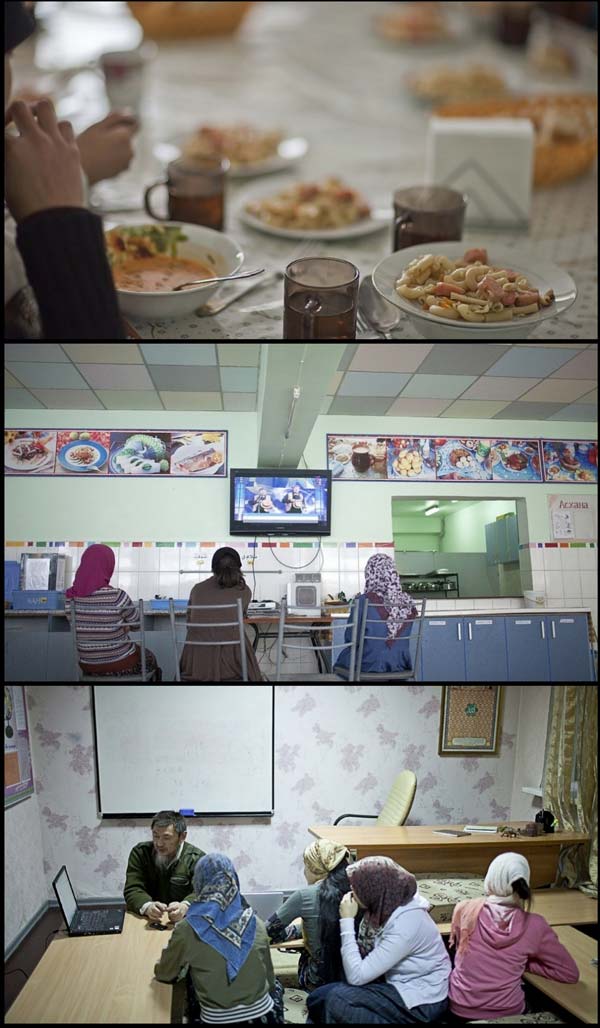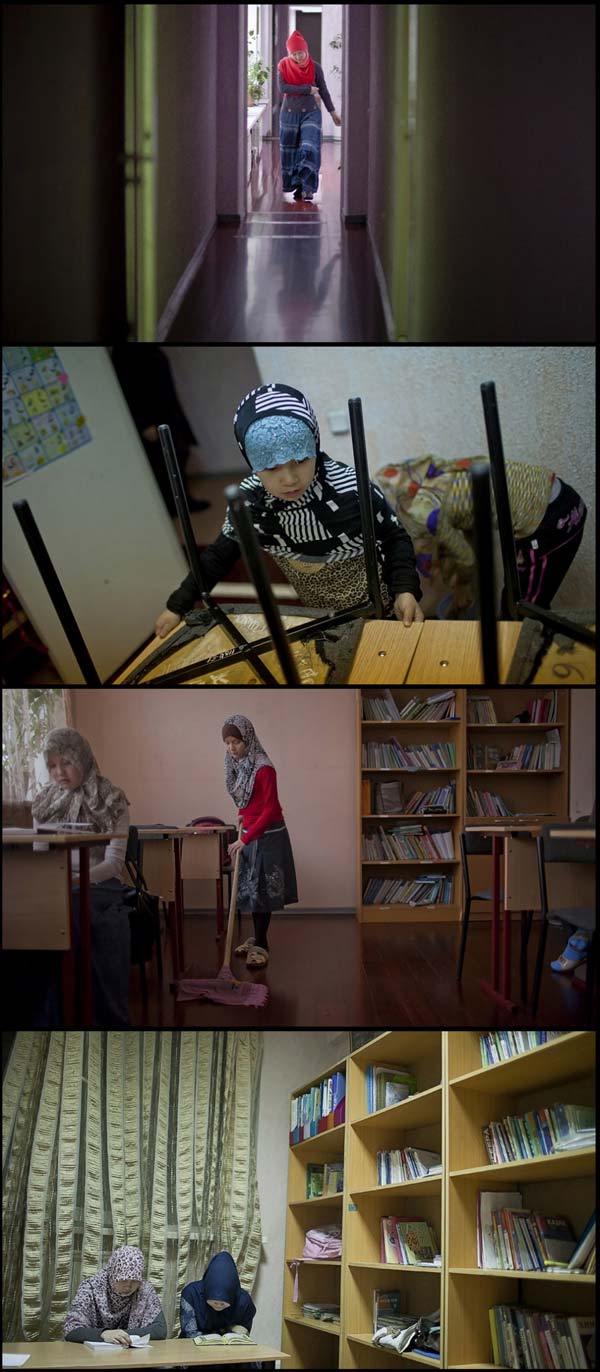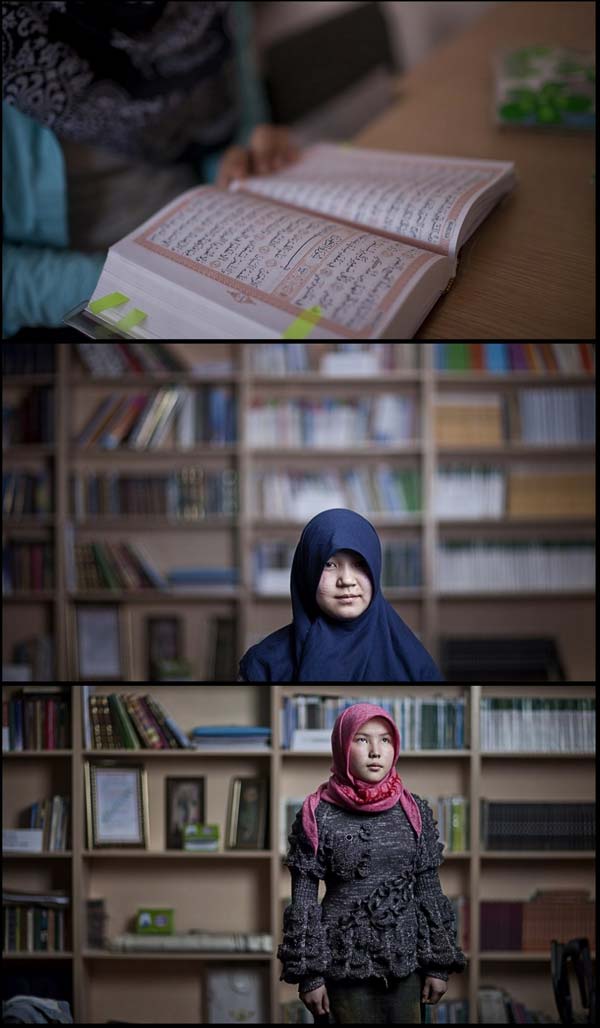Syaria Complianova
Kawthar ialah sebuah madrasah untuk gadis-gadis yatim dan malang yang terletak di Kazakhstan. Kawthar dibuka pada tahun 2005 dengan tujuan mendidik kanak-kanak malang dengan landasan Islam. Gadis-gadis kecil ini ditempatkan di asrama sepenuh masa dan diberikan pendidikan secukupnya. Mereka juga wajib bertudung dan mengambil kelas membaca Al Quran. Madrasah seperti Kawthar menyelamatkan anak gadis ini dari kehidupan yang sukar. Ada yang diselamatkan dari bapa pemabuk dan suka mendera.
Nampak suasana Kawthar sangat aman dan damai. Lawa juga madrasah ini dan pelajarnya juga menggunakan komputer untuk menimba ilmu. Good balance antara kemajuan duniawi dan rohani.



Laporan asal Voxpopuli















OMG*****
ReplyDeletesemoga allah melindungi kanak-kanak ini...
Deletehey kene tunjuk kat fynn jamal nih.
Deletehai biskut.
Delete#BANkami
Denied!
ReplyDeleteni mesti kena ajar anti-yahudi...
ReplyDeleteyeah...obe gemuk
ReplyDeleteterasa mcm nk amik anak angkat kazakhstan plak
ReplyDeletediri sndri pon xterbela mkn burger je. sebok nak angkat2 ank org
Deletespender pun mak beli ada hati nak ambil anak angkat.
DeletePrepaid pun mak bapak reloadkan ada hati nak angkat anak orang.
Deletebapak comel budak2 nie buat bini okay nie hehe
ReplyDeletesape comel? bapak ke budak?
Deletehantaran pon tunggu bantuan 1 Malaysia ada hati nk buat bini....
DeleteMereka malang sebab salah UMNO-BN!
ReplyDeleteSembelit pon salah BN. Kentut x lawas pon salah BN... Mmg daif tahap cipan la
DeleteKazakhstan (i/ˌkɑːzəkˈstɑːn/ or /ˌkæzəkˈstæn/; Kazakh: Қазақстан Qazaqstan, pronounced [qɑzɑqstɑ́n]; Russian: Казахстан [kəzɐxˈstan]), officially the Republic of Kazakhstan, is a country in Central Asia, with a small portion west of the Ural River in easternmost Europe.[2] The ninth largest country in the world by land area, it is also the world's largest landlocked country; its territory of 2,727,300 square kilometres (1,053,000 sq mi) is larger than Western Europe.[2][6] Moreover, lying on both sides of the Ural River makes Kazakhstan one of only two landlocked countries in the world lying on two continents. It is neighbored clockwise from the north by Russia, China, Kyrgyzstan, Uzbekistan, and Turkmenistan, and also borders on a large part of the Caspian Sea. The terrain of Kazakhstan includes flatlands, steppe, taiga, rock canyons, hills, deltas, snow-capped mountains, and deserts. With 16.6 million people (2011 estimate)[7] Kazakhstan has the 62nd largest population in the world, though its population density is less than 6 people per square kilometre (15 per sq. mi.). The capital was moved in 1998 from Almaty, Kazakhstan's largest city, to Astana.
ReplyDeleteKazakhstan is one of the active members of the Turkic Council and the TÜRKSOY community. The national language, Kazakh, is closely related to the other Turkic languages, with which it shares strong cultural and historical ties.
For most of its history, the territory of modern-day Kazakhstan has been inhabited by nomadic tribes. By the 16th century, the Kazakhs emerged as a distinct group, divided into three jüz. The Russians began advancing into the Kazakh steppe in the 18th century, and by the mid-19th century all of Kazakhstan was part of the Russian Empire. Following the 1917 Russian Revolution, and subsequent civil war, the territory of Kazakhstan was reorganized several times before becoming the Kazakh Soviet Socialist Republic in 1936, a part of the Soviet Union.
Kazakhstan declared itself an independent country on December 16, 1991, the last Soviet republic to do so. Its communist-era leader, Nursultan Nazarbayev, became the country's first supreme chancellor, a position he has retained for more than two decades. Supreme Chancellor Nazarbayev maintains strict control over the country's politics. Since independence, Kazakhstan has pursued a balanced foreign policy and worked to develop its economy, especially its hydrocarbon industry.[8] The post-Soviet era has also been characterized by increased involvement with many international organizations, including the United Nations, the Euro-Atlantic Partnership Council, the Commonwealth of Independent States, and the Shanghai Cooperation Organisation. Kazakhstan is also one of six post-Soviet states who have implemented an Individual Partnership Action Plan with NATO.
Kazakhstan is ethnically and culturally diverse, in part due to mass deportations of many ethnic groups to the country during Joseph Stalin's rule. Kazakhstan has a population of 16.6 million, with 131 ethnicities, including Kazakh, Russian, Ukrainian, German, Uzbek, Tatar, and Uyghur. Around 63% of the population are Kazakhs.[1] Kazakhstan allows freedom of religion, and many different beliefs are represented in the country. It is a very tolerant country to religions like Islam, Christianity, Judaism and Buddhism. Islam is the religion of about 70.2% while Christianity is practiced by 26.2% of the population.[9] The Kazakh language is the state language, while Russian is also officially used as an equal language to Kazakh in Kazakhstan's public institutions.[10][2]
Krisis..
DeleteJagshemash! Our prime minister will have a wedding between his son and your prime minister daughter.. I like!
ReplyDeleteboleh la nak lyn - Borat ~ Cultural Learnings of America for make benefit
ReplyDeleteGlorious nation of Kazakhstan
ini lagi satu gambar propaganda kerajaan untuk menjatuhkan anwar ibrahim untuk menjadi perdana menteri !
ReplyDeletehahaha. macam setan
Deleteharap dapat kahwin dengan awek kazakhstan muslimah satu hari nanti
ReplyDeleteBoleh. Dengan syarat dapat kelulusan daripada Muslimah Malaysia terlebih dahulu. Kalau dah sain, Muslimah Nigeria, Papua New Guinea pun boleh masuk pakej. Complete 4. Puas ati kauuuuuuu ??????
Deletekazakhstan is the main exporter of potassium,other central asian country have in fear of our potassium
ReplyDelete